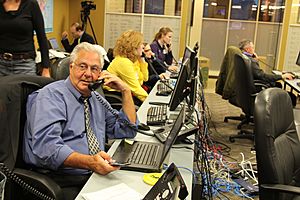Dick Armey facts for kids
Quick facts for kids
Dick Armey
|
|
|---|---|
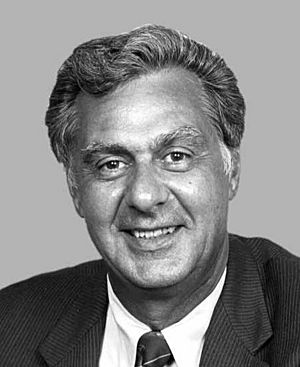
Armey in 1997
|
|
| Chair of the House Homeland Security Committee | |
| In office June 19, 2002 – January 3, 2003 |
|
| Preceded by | Position established |
| Succeeded by | Christopher Cox |
| House Majority Leader | |
| In office January 3, 1995 – January 3, 2003 |
|
| Speaker | Newt Gingrich Dennis Hastert |
| Preceded by | Dick Gephardt |
| Succeeded by | Tom DeLay |
| Chair of the House Republican Conference | |
| In office January 3, 1993 – January 3, 1995 |
|
| Deputy | Bill McCollum |
| Leader | Bob Michel |
| Preceded by | Jerry Lewis |
| Succeeded by | John Boehner |
| Member of the U.S. House of Representatives from Texas's 26th district |
|
| In office January 3, 1985 – January 3, 2003 |
|
| Preceded by | Tom Vandergriff |
| Succeeded by | Michael C. Burgess |
| Personal details | |
| Born |
Richard Keith Armey
July 7, 1940 Cando, North Dakota, U.S. |
| Political party | Republican |
| Spouse | Susan Armey |
| Children | 5 |
| Alma mater | Jamestown College (BA) University of North Dakota (MA) University of Oklahoma (PhD) |
| Profession | Economist |
Richard Keith Armey (born July 7, 1940) is an American economist and politician. He served as a U.S. Representative for Texas from 1985 to 2003. He was also the House Majority Leader from 1995 to 2003.
Armey played a key role in the "Republican Revolution" of the 1990s. This was when Republicans won majorities in both houses of Congress for the first time in 40 years. He helped write the "Contract with America," a plan of ideas for the Republican Party. After leaving Congress, Armey worked as an advisor and lobbyist.
Contents
Early Life and Education
Richard Armey was born on July 7, 1940, in Cando, North Dakota. He grew up in a rural area. He earned a Bachelor of Arts degree from Jamestown College. Later, he received a Master of Arts from the University of North Dakota. He also earned a PhD in economics from the University of Oklahoma.
Before entering politics, Armey was an economics professor. He taught at several universities, including the University of Montana and the University of North Texas. He was the chairman of the economics department at the University of North Texas from 1977 to 1983.
Serving in the U.S. House of Representatives
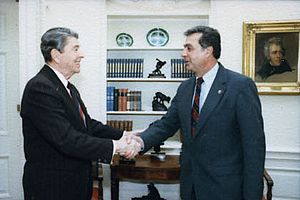
Armey was first elected to the United States House of Representatives in 1984. He represented Texas's 26th congressional district. He was reelected eight more times, serving until 2003. He consistently won his elections by large margins.
The Republican Revolution and Leadership Role
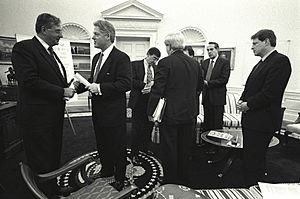
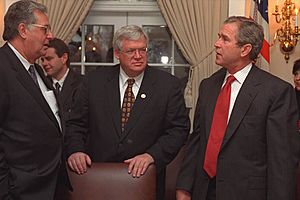
In 1994, Armey worked with Newt Gingrich to create the "Contract with America." This was a set of policy ideas that Republicans promised to work on if they won the election. Many believed this plan helped Republicans win control of Congress in the 1994 elections. This event was called the "Republican Revolution."
After the election, Newt Gingrich became the Speaker of the United States House of Representatives. Armey became the House Majority Leader, the second-highest Republican position. He had a lot of power in deciding which laws would be discussed in the House.
Challenges in Leadership
In 1997, some House Republicans tried to replace Speaker Gingrich. Armey was involved in these discussions. However, he decided to warn Gingrich about the plan. This led to changes in leadership, but Gingrich remained Speaker for a time.
After the 1998 elections, Republicans still held the majority in the House. Armey faced a challenge for his Majority Leader position but won. When Gingrich resigned as Speaker, Armey was considered for the role. However, he decided not to run, and Dennis Hastert became Speaker.
Later Congressional Career
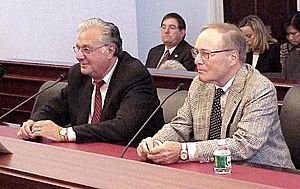
Armey served four more years in Congress before retiring in 2002. In his final term, he became chairman of the United States House Committee on Homeland Security. He was a main supporter of the law that created the Department of Homeland Security. This department helps protect the country from threats.
After Armey retired, Tom DeLay took over his role as House Majority Leader. Armey's son, Scott, ran for his father's old seat but did not win.
Advisor and Lobbyist Roles
After leaving Congress, Richard Armey continued to be involved in public policy.
Working with DLA Piper
Armey joined the law firm DLA Piper as a senior policy advisor. He also co-chaired their Homeland Security Task Force. In 2009, a group he led, FreedomWorks, spoke out against new health care reform ideas. This caused a conflict of interest for DLA Piper, so Armey left the firm.
Leading FreedomWorks
In 2003, Armey became co-chairman of Citizens for a Sound Economy. This group later merged and became FreedomWorks in 2004. FreedomWorks is a conservative non-profit organization. Armey's saying, "Freedom works. Freedom is good policy and good politics," inspired the group's name.
As chairman, Armey was a well-known political figure. He traveled to meet with activists and lawmakers. He left FreedomWorks in 2012.
Political Beliefs
Economy and Taxes
Armey is a free-market economist. He supported open immigration and free trade. He also favored changing Social Security and reducing farm subsidies. Armey strongly supported replacing the current tax system with a flat tax. He also helped create the Base Realignment and Closure Commission. This group was responsible for closing military bases to save money.
Health Care Ideas
In 1999, Armey proposed the Fair Care for the Uninsured Act. This idea suggested using tax credits to help people pay for health insurance. It would allow individuals to buy private health coverage directly. Some of these ideas later appeared in health care reforms in Massachusetts and the Patient Protection and Affordable Care Act. Armey was against the idea that people should be required to buy health insurance.
Foreign Policy Views
Armey initially had doubts about the Iraq War. He warned President George W. Bush that it could be a "quagmire," meaning a difficult situation to get out of. He voted for the war after being given information that later turned out to be incorrect.
See also
 In Spanish: Dick Armey para niños
In Spanish: Dick Armey para niños
 | Jewel Prestage |
 | Ella Baker |
 | Fannie Lou Hamer |


